
June 9, 2020
Program News
Astrobiologists Aid in Georgia COVID-19 Test Initiative
Astrobiologists at the Georgia Institute of Technology are using their expertise to help produce necessary components for COVID-19 test kits in the state of Georgia.
At this time of year, the Georgia Tech campus would typically be buzzing with the activity of students and Institute staff. However, the campus is currently closed to everyone apart from those involved in essential activities. This includes the activity of a group of astrobiologists who are hard at work on research efforts to help aid with COVID-19 response.
Over the years, the Astrobiology Program has supported a number of projects at GA Tech. This includes the Center for Chemical Evolution (CCE), a joint program between the National Science Foundation (NSF) and NASA Astrobiology, as well as a team of the former NASA Astrobiology Institute (NAI). Today, NASA Astrobiology continues to support many scientists at the Institute across a wide range of topics, including prebiotic chemistry and the origin of life, evolution and the early Earth environment, and studies on the potential habitability of icy moons. Each of these researchers is contributing to our knowledge of the origins of life and the potential for life in the Universe. In the past few months, they have used their expertise to aid in our country’s healthcare response here at home.
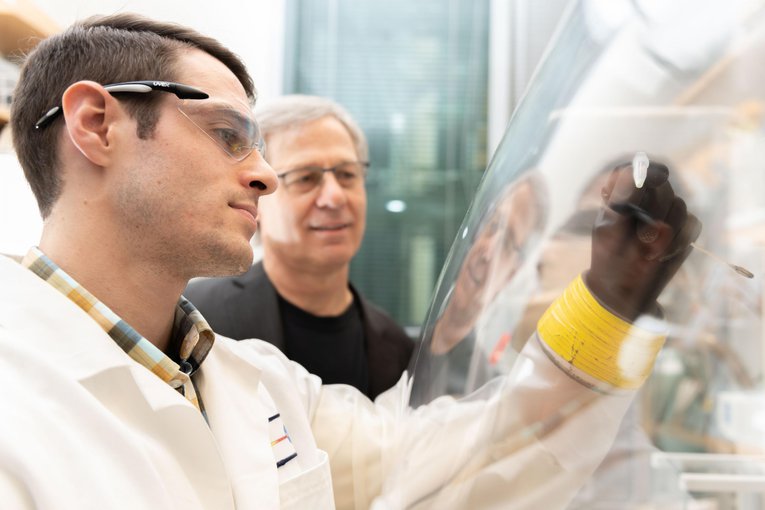
Loren Williams (right) in his lab at Georgia Tech in 2018, where Marcus Bray (left) observes a sample inside a sealed atmospheric tent that simulates atmospheric gas mixtures during Earth's earliest eon.Image credit: Georgia Tech / Allison Carter.
Alongside their work supported by the NASA Astrobiology Program, this team has expanded their laboratory efforts to include the production of biochemical components for COVID-19 test kits. The researchers are part of the State of Georgia COVID-19 Lab Surge Capacity Task Force, and they are collaborating with a number of other university labs across the state of Georgia. The work of these dedicated scientists is helping to address gaps in the supply of testing kits that provide a vital step in identifying people who are carriers of the virus and may need care, or individuals who may need to remain isolated from other people even though they are asymptomatic.
Astrobiology at Georgia Tech
Loren Williams (School of Chemistry and Biochemistry) is leading the Georgia Tech Test Kit Support Group. Williams is currently a Co-Lead of an Astrobiology Program Research Coordination Network (RCN) dubbed the Prebiotic Chemistry and Early Earth Environment Consortium (PCE3). He also serves as Director of the NASA-funded Center for the Origin of Life (COOL). Additional principal investigators supported by the Astrobiology Program who are part of the initiative include Jennifer Glass (School of Earth and Atmospheric Sciences) , who is also on the steering committee of the Network for Ocean Worlds RCN and a co-lead on the NASA-funded Oceans Across Space and Time, and Nicholas Hud (School of Chemistry and Biochemistry) a current PI with the Exobiology Program and steering committee member for the PCE3 RCN.
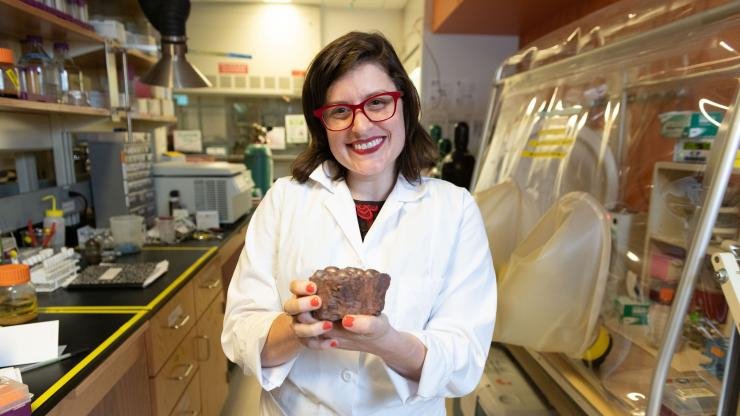
Jennifer Glass in her lab at Georgia Tech. She is holding a stromatolitic ironstone full of iron that rusted out of early oceans. An eon ago, oceans appear to have been full of ferrous iron, which would have facilitated production of N2O (laughing gas).Image credit: Georgia Tech / Allison Carter.
“Research scientists, grad students, technicians, and postdocs in biochemistry labs at Georgia Tech have been working around the clock,” said Jennifer Glass. “They are the real heroes here. They include many astrobiologists from Loren Williams’ lab including Jessica Bowman, Anton Petrov, Brooke Rothschild-Mancinelli, Petar Penev, Rebecca Guth-Metzler, Kavita Matange, Santi Mestre-Fos, Sara Fakhretaha-Aval, and Moran Frenkel-Pinter, as well as Chiamaka Obianyor, a PhD candidate in Nick Hud and Martha Grover’s lab. Another is Justin Lawrence, an astrobiology PhD candidate in Britney Schmidt’s lab, who working on testing different disinfectants for masks.”
The work of Justin Lawrence and the team of scientists supported by the NASA Astrobiology program was also featured in this recent story from National Geographic: https://www.nationalgeographic.com/science/2020/03/key-ingredient-in-coronavirus-tests-comes-from-yellowstone/
The team at GA Tech is making components for test kits that work using a reaction called the ‘reverse transcription quantitative-polymerase chain reaction (RT-qPCR).’ This reaction is used to identify the presence of small amounts of viral RNA in samples from a patient by taking that RNA and converting it to DNA. The DNA is then amplified by PCR and tagged with fluorescent probes, making it easy to spot.
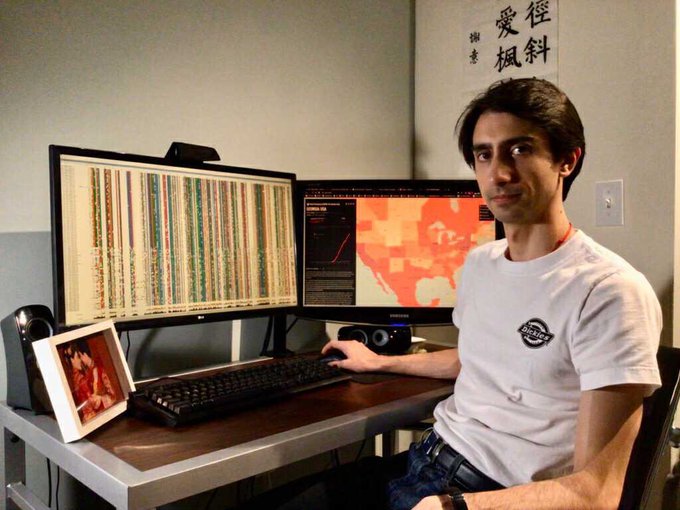
Petar Penev is a bioinformatician at Georgia Tech who normally studies ribosomal proteins and evolution. Penev is currently working with the team to investigate SARS-CoV-2 primer specificity.Image credit: GA Tech.
“Raquel Lieberman is a protein chemist at Georgia Tech who is also a Co-I on my current NASA Exobiology grant” said Glass. “In addition to us writing an exciting manuscript on our NASA project, she’s also an integral member of the Georgia Tech Test Kit Support Group. Her lab members are making the essential enzyme and protein components for the kit: reverse transcriptase, DNA polymerase, and ribonuclease inhibitor.”
The reverse transcriptase enzyme that Lieberman makes is the RTX enzyme developed by Andrew Ellington and his team at the University of Texas at Austin. This enzyme was developed in 2016 and has unique properties that allow scientists to replicate DNA and RNA faster and more accurately in the lab than previously before. (Further information on the RTX enzyme can be found in the accompanying article: Astrobiologists Aid in Fighting Coronavirus
“So far, the team has successfully synthesized, purified, and quality controlled the primers and primer-probes used in the reactions,” explained Glass. “These are [components of] the most common [test kits] currently being used in the US, but other types of tests that can give results in less time are coming online, and we might switch to working on those methods in the future.”
From Astrobiology to Virology
In utilizing their astrobiology skills to focus on the global pandemic, the team at GA Tech has faced a number of logistical challenges. As researchers continue their work in the laboratory, care is taken to make sure safety procedures are in line with recommendations from the Centers for Disease Control and Prevention (CDC). The team has remained connected by video chat, with each member performing tasks in isolation. An electronic ‘buddy system’ has been implemented so that the scientists, while isolated, still have access to emergency help if necessary.
“Research scientists, grad students, technicians, and postdocs in biochemistry labs at Georgia Tech are the ones doing the bulk of the work,” said Glass. “But they are social distancing, and all of the meetings are virtual. I miss the days when we could all talk science together on campus.”
The efforts of the team have required researchers to quickly adapt and learn new skills, expanding their work to research beyond their typical fields of expertise.
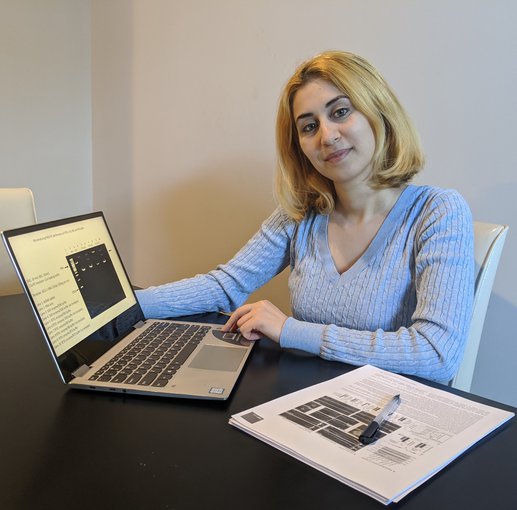
Sara Fakhretaha-Aval of the Williams Group in the Center for the Origin of Life at Georgia Tech. Fakhretaha-Aval works on optimizing the reaction condition for RTX reverse transcriptase enzyme in RT-qPCR.Image credit: GA Tech.
“It has been a steep learning curve,” Glass remarked. “The last six weeks have been a big crash course in virology and medical testing.”
Astrobiology includes experts from a myriad of scientific fields, and the multi- and cross-disciplinary nature of astrobiology is a strength when it comes to adaptability in the lab.
“Luckily a lot of the same basic methods apply,” Glass continued. “I did real-time quantitative polymerase chain reactions on cyanobacterial cultures as a grad student, so that background helped me to understand the principles behind the RT-qPCR test kits.”
The team at GA Tech isn’t testing patients themselves. Instead, they are working to equip other labs in Georgia that are specialized in working with human samples. With their efforts, the team has been able to deliver ingredients for hundreds of tests kits a day.
A View for the Future
Many scientists across the country are stepping forward to lend their expertise to aid with coronavirus response. Astrobiologists are no exception.
“We feel very fortunate to be able to contribute to these efforts,” said Glass. “We really hope our efforts can boost testing abilities in Georgia to help our state and our nation.”
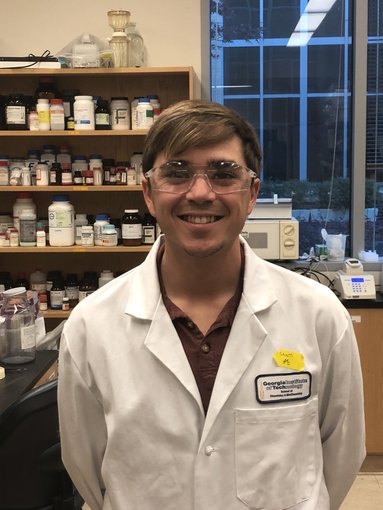
Santi Mestre-Fos of the Williams Group in the Center for the Origin of Life at Georgia Tech. Mestre-Fos studies the rRNA expansion segments (ESs) of the human and yeast ribosomes.Image credit: GA Tech.
Glass and her colleagues also hope to have testing capabilities in place at GA Tech by the fall to ensure the safety of the campus community once it is determined that students and University personnel can return. This includes the safety of campus activities and events, such as the 2021 Astrobiology Science Conference (AbSciCon), which will be hosted in Atlanta and is being organized by GA Tech.
“We have a long way to go, but we have come a long way and we have really bright minds working on the problem,” said Glass. “We are so excited to host AbSciCon in Atlanta one year from now. Please know we are working to do everything within our power to welcome colleagues to our city in 2021!”
Related Links:
Center for Chemical Evolution
PCE3 (NASA Astrobiology RCN)
NASA COVID Response
Georgia Tech Produces Key Components for Governor’s Coronavirus Test Initiative (GA Tech)
Georgia Tech research team wins NASA grant to study microbe/methane connection on Earth, planetary moons (GA Tech)
GA Tech Astrobiology Program (GA Tech)
Ellefson et al. (2016) “Synthetic evolutionary origin of a proofreading reverse transcriptase,” Science. DOI: 10.1126/science.aaf5409